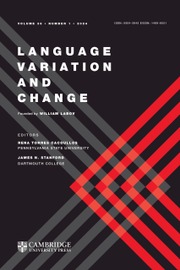Article contents
Writing good Southerne: Local and supralocal norms in the Plumpton letter collection
Published online by Cambridge University Press: 05 September 2002
Abstract
The relatively recent application of sociolinguistic methodology to the study of language history offers techniques for approaching regional and social variation and change in earlier stages of English. This article focuses on changes in written norms in the history of English, examining several morphosyntactic variables that were in flux in England in the 15th and 16th centuries: the third person present singular verb endings, the third person plural be, and the Northern Present-Tense Rule for third person plural verbs. These variables are significant because each of them presents two competing forms in the north of England in the Early Modern period: a local form and a supralocal form. The present analysis, after examining the correlation between the linguistic variables and gender and social function, concludes that the results may be understood through a conflict model in which variants supralocalize to accommodate the demands of alternative linguistic markets.
- Type
- Research Article
- Information
- Copyright
- © 2002 Cambridge University Press
- 7
- Cited by




